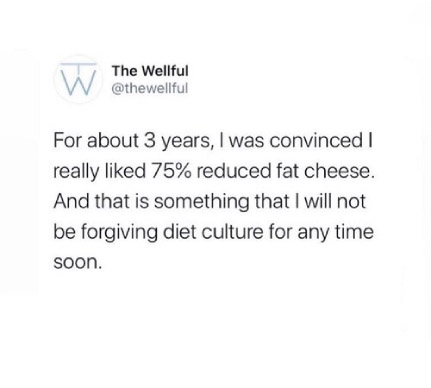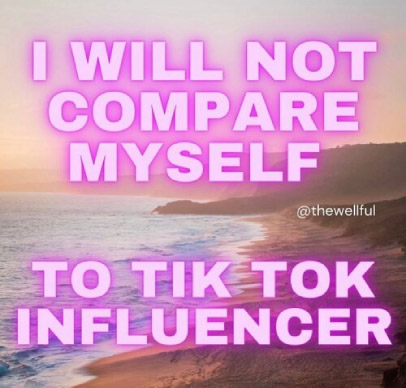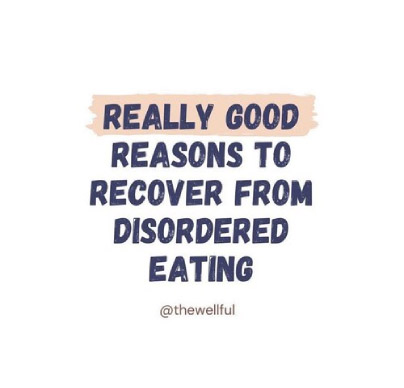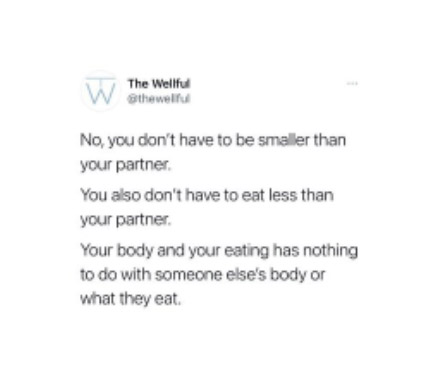Many of us can relate to having a ‘weird’ relationship with food. We all experience varying degrees of diet culture, our weight-focused society and have different personal histories and influences that contribute to how we think about and interact with food. Some people are more prone to having disordered food thoughts than others, but the fact of the matter is that we live in a world that often pushes an unhealthy narrative. Media and society as a whole tend to glorify restrictive diets and unrealistic body standards, neither of which are helpful for building a sustainable relationship with food.
Still, knowing that it’s important to identify and call out diet culture is one thing; embracing those changes within your own relationship with food is another challenge. Even if you inherently know that many of your disordered food thoughts aren’t positive, it can be hard to reframe your thinking in a way that supports the opposite. That’s where working with a registered dietitian like myself could help.
One key aspect of fostering positive eating habits and challenging disordered food thoughts is listening to our bodies and honoring our hunger and fullness cues. It is essential to eat when we are hungry without judgment or restriction, but knowing how to identify those feelings could be tricky, especially if you’ve been in a disordered mindset for a while. And if you are reading this thinking “that’s cool but I don’t even know the last time I felt my hunger or fullness cues” – you are not alone. I regularly work with people to help them relearn hunger and satiety and, as a result, learn to better trust their bodies. There are so many reasons that we get disconnected from these cues throughout our life and there are a few approaches that help them in coming back or feeling easier to recognize.
Another important aspect of combatting disordered food thoughts is embracing the concept of intuitive eating. Intuitive eating encourages us to eat based on our body’s natural hunger and satiety, but also based on food preferences. It’s not a bad thing to want a certain taste or flavor; in fact, acknowledging that you do means you’re in tune with what your body is asking for. Intuitive eating shifts the focus from external rules and restrictions to internal cues and signals, promoting a positive and compassionate approach to eating.
Another component to reframing disordered eating is to make meals positive experiences. That means practicing tools and strategies that help make mealtime more tolerable with less judgment, stress, and harsh internal dialogue. We are born with an innate ability to eat when we are hungry, choose foods for enjoyment, and feel a sense of trust and curiosity within our bodies. Exploring your relationship with food and your body now can allow you to reconnect with those innate feelings, trust and compassion for yourself.
Body Image & Disordered Food Thoughts
Your relationship with food might not feel tied to your body or self image, but if it does you are not alone. For many, addressing disordered food thoughts goes hand in hand with body image. Society often bombards us with unrealistic beauty standards, which can lead to having a negative body image and experiencing harmful thoughts about our physical appearances. Exploring body acceptance and/or body neutrality involves challenging these societal norms and celebrating the diversity of body shapes and sizes.
One important step is to practice self-compassion and self-acceptance. Instead of criticizing our bodies for not fitting into societal ideals, we can choose to appreciate and respect our bodies for all the amazing things they do for us. This shift in mindset allows us to focus on self-care and nourishment rather than on achieving a specific look.
Surrounding ourselves with positive influences and supportive communities can also greatly impact body image. Seek out positive social media accounts and resources that promote inclusivity, diversity, and self-care. Participate in conversations that challenge harmful beauty standards and empower individuals to embrace their bodies. With more uplifting messages, we can counteract the negative societal pressures and promote a nurturing environment.
Lastly, it is important to remind ourselves that health comes in all shapes and sizes. That is the entire mentality behind Health at Every Size (HAES®), which is part of our foundation for this work at The Wellful. True health cannot be determined by appearance alone but is influenced by various things like mental well-being, emotional balance, weight-stigma and overall lifestyle. By shifting our focus from external appearance to overall well-being, we can cultivate better relationships with both food and our bodies.
Building a Healthy Relationship with Food
Nurturing a healthy relationship with food is an ongoing process that requires patience, self-reflection, and self-compassion. There’s no such thing as perfection when it comes to eating. When we allow ourselves to eat for pleasure, nourishment, tradition, culture, celebration, convenience we allow ourselves to feel more present, flexible and confident in our choices. Instead of punishing ourselves or falling into a cycle of guilt and shame, a better alternative would be to practice compassion, acceptance,and self-care.
Building a more positive relationship with food is integral for reframing disordered food thoughts. Our thoughts have a powerful impact on our actions and emotions. By recognizing and challenging negative or distorted thoughts about food, we can replace them with more rational and positive beliefs. This process requires self-awareness and may benefit from professional guidance or therapy.
Reframe Disordered Food Thoughts by Eliminating Labels
One effective strategy for reframing disordered food thoughts is cognitive restructuring. This involves identifying negative thought patterns related to food, such as labeling certain foods as “good” or “bad,” and replacing them with more balanced and realistic thoughts. For example, instead of thinking, “I can’t eat this cookie because it will change my body,” we can reframe it as, “I can enjoy this cookie as part of a balanced and varied diet” or “I’m putting a lot of pressure on this single food choice but I know that flexibility and pleasure around food is important to me and my wellbeing.” At The Wellful, we believe that by offering yourself more opportunities to explore, experiment and rebuild trust with your body is at the foundation of moving toward a more peaceful, sustainable relationship with yourself.
Remember, banishing negative food thoughts and fostering a positive relationship with eating is a journey unique to each individual. Be kind to yourself, seek support when needed, and celebrate every step towards a healthier and happier relationship with food.
Rebuilding Your Relationship with Food
The path to inner peace often begins with learning to nourish ourselves, in body and spirit. At The Wellful, we help you rewrite old stories around food and your body so you can create new, empowering ones.
As you make peace with food and your body, you will gain mental space to focus on what matters most – fulfilling relationships, creativity, purpose. The possibilities will open. You don’t have to walk this path alone. Get started by scheduling a free 15-minute consultation with Brenna, or contact us today at 925-725-2761 to begin co-creating your new story.











